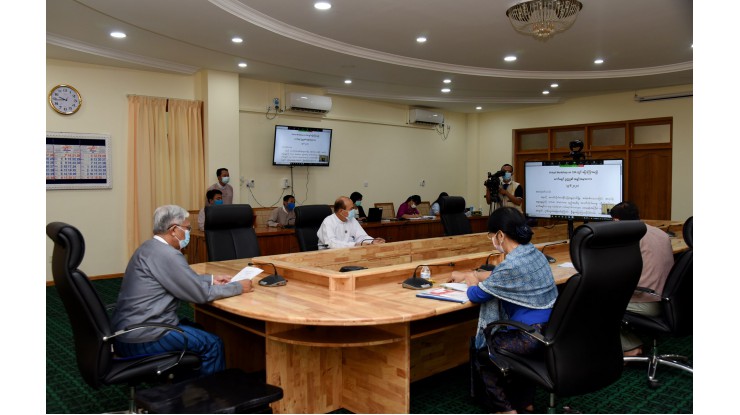Virtual Workshop on CRA တွင် ပြောကြားသည့် ကော်မရှင် ဥက္ကဌ၏ အဖွင့်အမှာစကား
- Tue, 9 June 2020

(၉-၆-၂၀၂၀)
အားလုံးမင်္ဂလာပါ။
အခုလို အဂတိလိုက်စားနိုင်ခြေအန္တရာယ်ရှိမှု ဆန်းစစ်လေ့လာခြင်း အလုပ်ရုံ ဆွေးနွေးပွဲကို Virtual Workshop နည်းစနစ်နဲ့ အဂတိလိုက်စားမှု တိုက်ဖျက်ရေး ကော်မရှင်က ယခု COVID-19 ကပ်ရောဂါကာလမှာ ပထမဆုံးအကြိမ် ကျင်းပနိုင်ခြင်းအတွက် ဂုဏ်ယူဝမ်းမြောက်ကြောင်း ဦးစွာပြောကြားလိုပါတယ်။ ယခု အလုပ်ရုံဆွေးနွေးပွဲမှာ ပို့ချဆွေးနွေးပေးမဲ့ UNDP နဲ့ UNODC တို့မှ ပညာရှင်များနှင့်တကွ ပါဝင်ဆွေးနွေးမည့် ပြည်ထောင်စုဝန်ကြီးဌာနများနဲ့ ပြည်ထောင်စုအဆင့် အဖွဲ့အစည်းများမှ CPU အဖွဲ့များကို ကျေးဇူးတင်ရှိကြောင်းလည်း ပြောကြားလိုပါတယ်။
CPU များ ဖွဲ့စည်းရေးကို ၂၀၁၈ ခုနှစ်၊ ဇူလိုင်လမှစပြီး ကျွန်တော်တို့ စတင်ကြိုးစားအားထုတ်ခဲ့တာ မှတ်မိကြမယ်ထင်ပါတယ်။ ၄-၅-၆ လခန့် အချေတင်ဆွေးနွေးခဲ့ကြပြီးမှ နောက်ဆုံးညှိနှိုင်းသဘောတူညီမှုရခဲ့တဲ့အတွက် CPU ဖွဲ့စည်းရေး ရှေ့ပြေးစီမံချက်အဖြစ် ပြည်ထောင်စုဝန်ကြီးဌာန( ၁၄ ) ခုမှာ ၂၀၁၉ ခုနှစ်၊ ဇန်နဝါရီလမှစပြီး ဖွဲ့စည်းခဲ့ပါတယ်။ ယခုအခါမှာတော့ ပြည်ထောင်စုအဆင့်ဌာန၊ အဖွဲ့အစည်းပေါင်း ( ၂၂ ) ခုမှာ CPU များ ဖွဲ့စည်းထားတာကို အားရဖွယ်တွေ့ရှိရပါတယ်။
CPU များ စတင်ဖွဲ့စည်းခဲ့ပြီးနောက် လုပ်ငန်းကျွမ်းကျင်မှုအတွက် သင်တန်းအစီအစဉ်၊ ဌာနကြီးမှူးများအဆင့်အတွက် အလုပ်ရုံဆွေးနွေးပွဲအစီအစဉ်များကို UNDP ၊ UNODC တို့နဲ့ ပူးပေါင်းဆောင်ရွက်ခဲ့ပြီးလည်းဖြစ်ပါတယ်။ ယခုပြုလုပ်မည့် အလုပ်ရုံဆွေးနွေးပွဲကတော့ CPU များ၏ ရည်မှန်းချက်တာဝန်(၃)ရပ်ထဲက တစ်ခုဖြစ်တဲ့ အဂတိလိုက်စားမှု ဘေးအန္တရာယ်ဖြစ်နိုင်ခြေရှိမှု (corruption risks)များ ဆန်းစစ်လေ့လာခြင်း ပညာရပ်(CRA)ကို နိုင်ငံတကာအတွေ့အကြုံရှိတဲ့ UNDP ၊ UNODC တို့မှ ကျွမ်းကျင်သူပညာရှင်တို့က ဆွေးနွေးပေးသွားမှာဖြစ်ပါတယ်။ COVID-19 ကပ်ရောဂါ ကာလအတွင်းမှာ ACC အနေနဲ့ virtual အလုပ်ရုံဆွေးနွေးပွဲ ပထမဆုံးအကြိမ်ဖြစ်တဲ့အတွက် ဘာသာရပ်ဆိုင်ရာသာမက၊ စက်ပိုင်းဆိုင်ရာကျွမ်းကျင်မှုများကို ဖြည့်ဆည်းနိုင်ဖို့ ကြိုတင်ပြင်ဆင်မှုများကို အချိန်ယူပြီးပြုလုပ်ခဲ့ရပါတယ်။ ယခင်က ပုံမှန်ပြုလုပ်နေကျ လူကိုယ်တိုင် တက်ရောက်ပါဝင်ဆွေးနွေးခြင်းမျိုးအစား ပုံမှန်အသစ် (New Normal ) အနေအထားနဲ့ online ပေါ်ကဆွေးနွေးခြင်း၊ အမြင်ချင်းဖလှယ်ခြင်းမျိုးကို ကျွန်တော်တို့တဖြည်းဖြည်း နေသားကျလာရန် လိုအပ်ပါတယ်။
CPU အဖွဲ့များအနေနဲ့ CRA နဲ့ ပတ်သက်ပြီး ပိုမိုနားလည်သဘောပေါက်မှသာ CPUလုပ်ငန်းတာဝန်များကို လက်တွေ့လုပ်ဆောင်နိုင်မှာဖြစ်ပါတယ်။ ထို့အပြင် CRA ဟာ ဝန်ထမ်းများအတွက် ထိခိုက်နစ်နာမှုအနည်းဆုံးနဲ့ အဂတိကင်းစင်အောင် လုပ်နိုင်သော အကောင်းဆုံးနည်းလမ်းဖြစ်သည်ကို လူကြီးများ နားလည်သဘောပေါက် လာနိုင်စေရန်အတွက် ရှင်းလင်းတင်ပြနိုင်ဖို့သိပ်အရေးကြီးပါတယ်။ CPU များ အနေနဲ့ မိမိတို့ အဖွဲ့အစည်းအတွင်း အဂတိလိုက်စားမှုပြဿနာများကို တားဆီးကာကွယ်နိုင်ရန်အတွက် မိမိတို့ဌာန အဖွဲ့အစည်းက လက်ခံကျင့်သုံးနေတဲ့ ဥပဒေ၊ နည်းဥပဒေ၊ စည်းမျဉ်း စည်းကမ်း၊ ညွှန်ကြားချက်အမိန့်များမှာ ဂယ်ပေါက် loophole များ ရှိနေခြင်းကြောင့် အကျင့်ပျက်မှုများဖြစ်ပေါ်နေခြင်းလားဆိုပြီး ဆန်းစစ်သုံးသပ်နိုင်ရန် ဖြစ်ပါတယ်။ ယခုလို assessment လုပ်နိုင်ဖို့က လုပ်ငန်းကို လက်တွေ့အကောင်အထည်ဖော် ဆောင်ရွက်နေတဲ့ CPU အပါအဝင် working level ဝန်ထမ်းများက အသိဆုံးဖြစ်ပါမယ်။ ယင်းအတွက်ကြောင့်လည်း CPU များ၏ ရည်မှန်းချက် တာဝန် (၃) ရပ်မှာ CRA ကို ထည့်သွင်းထားရခြင်း ဖြစ်ပါတယ်။
ACC အနေနဲ့ တစ်ဖက်မှာ ကုလသမဂ္ဂ အဂတိလိုက်စားမှုတိုက်ဖျက်ရေးကွန်ဗင်းရှင်း (UNCAC) အကောင်အထည်ဖော်ဆောင်မှု သုံးသပ်ခြင်းလုပ်ငန်းစဉ်မှာ ကွန်ဗင်းရှင်း အဖွဲ့ဝင်နိုင်ငံ တစ်နိုင်ငံအနေနဲ့ အဓိကအခန်းကဏ္ဍမှ ပါဝင်ဆောင်ရွက်လျက်ရှိပြီး အခြားတစ်ဖက်မှာ အာရှ-ပစိဖိတ်ဒေသတွင်းနိုင်ငံများ ငွေကြေးခဝါချမှု၊ အကြမ်းဖက်မှုကို ငွေကြေးထောက်ပံ့မှု စံချိန်စံညွှန်းများကို လိုက်နာဆောင်ရွက်မှုအပေါ် အဖွဲ့ဝင်နိုင်ငံ အချင်းချင်း အပြန်အလှန် အကဲဖြတ်ခြင်းလုပ်ငန်းစဉ်တွင်လည်း မိမိနိုင်ငံအတွက် အဂတိလိုက်စားမှုနယ်ပယ်၌ ဘေးအန္တရာယ်များဖော်ထုတ်ခြင်း၊ အကဲဖြတ်သုံးသပ် ဆောင်ရွက်ခြင်းတို့ကို ပူးပေါင်းဆောင်ရွက်ပေးရန်ဖြစ်ရာ၊ ယခု အလုပ်ရုံဆွေးနွေးပွဲက ACC ၏ ME လုပ်ငန်းစဉ်ကိုပါ ဖြည့်ဆည်းပေးရာရောက်ပါကြောင်း အခွင့်ကြုံခိုက် အသိပေး ပြောကြားလိုက်ပါတယ်။









